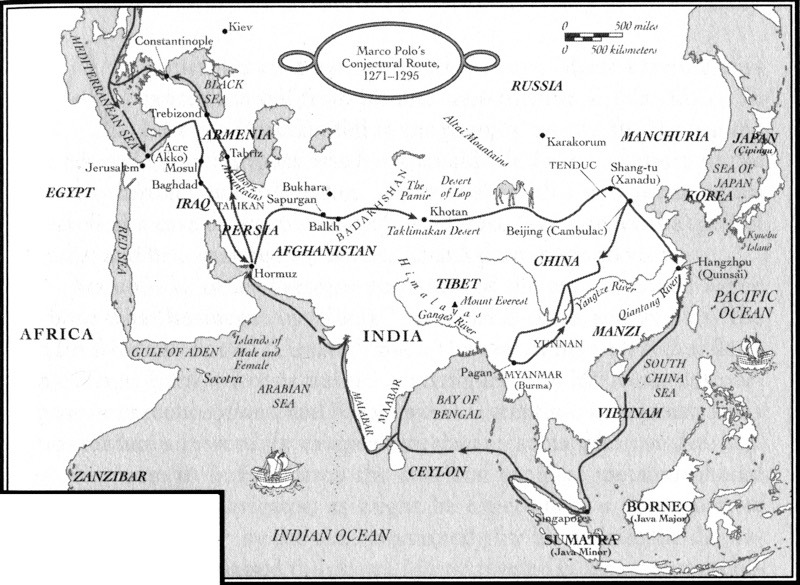by Laurence Bergreen
Marco Polo’s Travels is one of the great books of Western literature; its tale of distant lands, exotic cultures, vast wealth, huge armies, and great travails is surely one of the epic adventures of all history. The Polos’ achievement in traveling from Venice along the Silk Road all the way to Cambulac (modern Beijing) and back again is staggering. The odds against anybody completing such an audacious journey were enormous; the Polos were possessed of luck, skill, and tenaciousness in abundance to pull this off. The journey consumed 24 years, during which time Marco Polo traveled at least 30,000 miles, enough to circle the globe:

During much of the journey, highway robbers posed an ongoing threat, as did extreme cold, vast deserts, and towering mountain passes. At times their route was blocked by war and they had to wait years before they could continue their journey.
Marco Polo was blessed with charm, a good memory, and the ability to relate his adventures with clarity and power. These skills brought him into the good graces of Kublai Khan, the most powerful man in the world. The Khan needed reliable intelligence about his domains, and his Asian minions were unable to provide him with the insightful intelligence he needed. Marco Polo was perfect for the Khan’s needs; he was a shrewd observer of human behavior and quickly learned the social dynamics of the places he visited. His easy sociability gave him access to the true thoughts of those he visited, and his status as an outsider -- neither Mongol nor Chinese nor Muslim -- gained their trust. The Khan sent Marco Polo on trips throughout the empire, and Polo always reported back with long stories that enlightened the Khan about the true condition of his dominions. Indeed, Polo was too good at his job -- the Khan refused to permit him to return home. As Kublai Khan aged, this became an increasingly pressing problem, for upon his death, the Polos would be shorn of their protection and would likely become victims of any aristocrat who had taken a disliking for them -- which, in the Mongol court, was almost a certainty. After much importunation, the Khan gave them an assignment in India with ambiguous instructions as to his return. With a wink and a nod, he send the Polo family off, never to see them again. They returned home by way of India; upon their arrival in Venice, they had difficulty convincing their family that they truly were the same people who had departed a quarter of a century earlier. They looked and dressed like Mongols, and their Italian was rusty. Eventually they succeeded and settled down to a comfortable life with the riches they had brought back with them.
A few years later, Marco was captured by the Genoese during a war with Venice. This proved to be a blessing in disguise; while luxuriously imprisoned in a Genoese castle, he occupied himself by dictating his memoirs to another prisoner who was a professional writer. Although his memory of details was excellent, he did have problems with the sequence of events; his tale jumps forwards and backwards in time like the ramblings of an excited storyteller with too much too tell. He also mixed up details from separate adventures, and in a number of cases embellished his own role in the events he witnessed. To make matters worse, his amanuensis added his own layer of distortion. As a professional writer, he couldn’t resist the opportunity to throw in some of the standard tales of chivalry and romance that were so popular with European audiences of the time. Moreover, he added a proper Christian tone to the tale, inserting invidious phrases into any mention of other religions as well as plenty of pious nonsense that almost certainly did not come from Marco’s mouth. Thus, the end result is a mishmosh of material. To make matters worse, Marco continued telling his tales after he was released back to Venice, and some of these versions were integrated into other copies of the book. Indeed, most copyists (remember, this was before printing) did not scruple to engage in fanciful editing of the manuscript as they made their own copies.
As a consequence, there is considerable uncertainty as to what material constitutes the genuine words of Marco Polo. Scholars for more than a century have tracked down different copies of the manuscript, cross-compared them, and tried to extract the material that seems most reliable. Even then, the current version of Marco Polo’s Travels is still a mishmosh of disconnected events, all told from a point of view alien to modern readers. I have made several forays into the book, and always retreated in horror. But Laurence Bergreen has fixed the problem. His extensive research into the background and context of the times permitted him to tell Marco Polo’s story in a clear and continuous narrative. Bergreen makes no attempt to present Marco’s own version; instead, he composes his own version of what really happened, making his own judgements as to the personal foibles that might have distorted Marco’s version of events. The result is good history and a roaring good tale.
